ID120:
Meeting Times, Location, & Course Delivery Details
Contact Information
Textbook
O'Brien and O'Brien, After Gandhi: One Hundred Years of Nonviolent Resistance, Charlesbridge, 2018

The purpose of this course is to help students adjust to the demands of college courses and various aspects of college life beyond their classroom experience. In addition, students will:
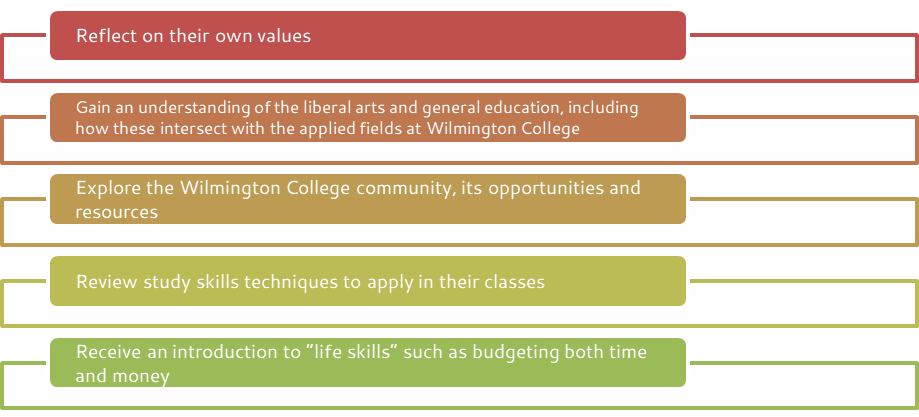
Course Schedule
Date | Topics & Readings | Writing, Quizzes, & Assignments |
| F 8/15 | Orientation: Incoming class welcome to FYE Meet with your FYE class | |
M 8/18 W 8/20 | What is a syllabus? Arriving on Campus – Tip review: People, Places, Patience Read: After Gandhi, chapter 1 discussion (your summer reading) Intro: Your College Passport | Complete Global Education on-line survey Online quiz (due before class): Gandhi chapter 1 |
M 8/25 W 8/27 | Speaker visit: Jason Dixon (some sections in McCoy, Kelly) College Study Skills: Seating, Note-taking, Lecture varieties, “Crash Course: Note-taking” (packet & video link on Blackboard) Self-navigated assignments overview: Life Skills, Study Skills, Self-Awareness Skills | # 1 Due: Turn in event attendance selfie Online quiz: study skills |
M 9/1 W 9/3 | LABOR DAY – no classes Read: instructor’s choice from Gandhi text; Wilmington College’s Mission &Vision, Core Values, Queries (college website) | Submit: Self-navigated assignment choice Assignment due: College passport, partial draft |
M 9/8 W 9/10
| Read “One” (Blackboard), Core values essay assignment
Diversity & Inclusion, Chip Murdock meet in McCoy, Kelly Center? | Online quiz: “One” #2 Due: Event attendance selfie OR proof of math/writing/wellness center visit Assignment due: WC’s values & myself (2-page reflection) |
M 9/15 W 9/17 | Reading TBD: instructor choice from Gandhi text Self-navigated assignment, in-class workshop; Westheimer overview
| Assignment due: College passport Assignment due: self-navigated |
M 9/22 W 9/24 | REQUIRED: “Sex Signals” presentation (Title IX): Monday, Sept XX at either 7:00 pm Academic advising: An introduction to the Liberal Arts & taking inventory, Glossary of academic terms 4-year plans & spring scheduling Thursday & Friday – Academic planning conferences | Online quiz (due before class) academic terms—end of syllabus! #3 Due: Event attendance selfie OR proof of math/writing/wellness center visit |
M/T 9/29–30 M 9/29 W 10/1 | WESTHEIMER PEACE SYMPOSIUM, “Practicing Art, Practicing Nuclear Abolition” Art & Nuclear Abolition
4-year plans & spring scheduling; Westheimer discussion | Assignment due: Spring schedule draft/4-year plan |
M 10/6 10/6 | Conclusions & FYE exit survey Last day for all abbreviated session I classes | Due: Westheimer selfie & program summary FYE Exit survey (in class) |
**syllabus subject to change
Special events: Attendance is required at:
- “Sex Signals” presentation (Title IX): Monday, Sept 30th at either 4:00 or 7:00 pm
- Any campus event (only one may be a sporting event other than your own!): Ice cream socials, Org Fairs, campus speakers
- Any sessions of the Westheimer Peace Symposium
- You must schedule (and attend!) at least one appoint with one of the student support offices on campus
College Passport: As an incoming student you are required to visit & participate in a minimum number of places/services on campus. You will download the passport PowerPoint slide show from Blackboard—save it on your own device and then visit any 10 of the locations listed. Each location asks for different information and a selfie of you in the space (you may do this with other students!) Turn the completed passport in to your instructor.
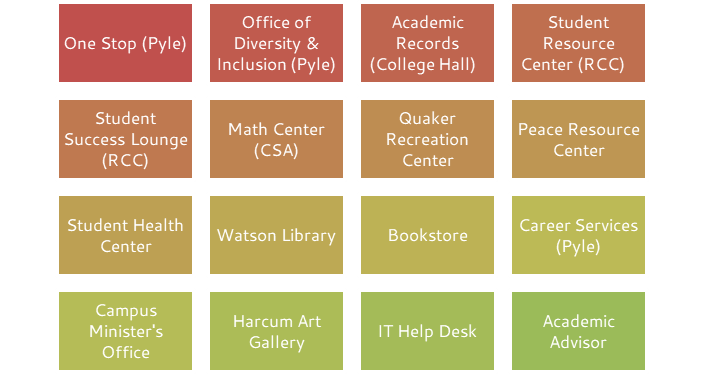
Written Reflections:
- Core Values reflection
- College & Life Skills: self-navigated assignment & reflection
- Westheimer program summary and review

Spring Schedule Advising, Program Mapping: Students will work on a program and tentative spring schedule in order to be prepared for the advising period. This mapping will include plotting requirements and sequencing for general education, your major and any minor programs.
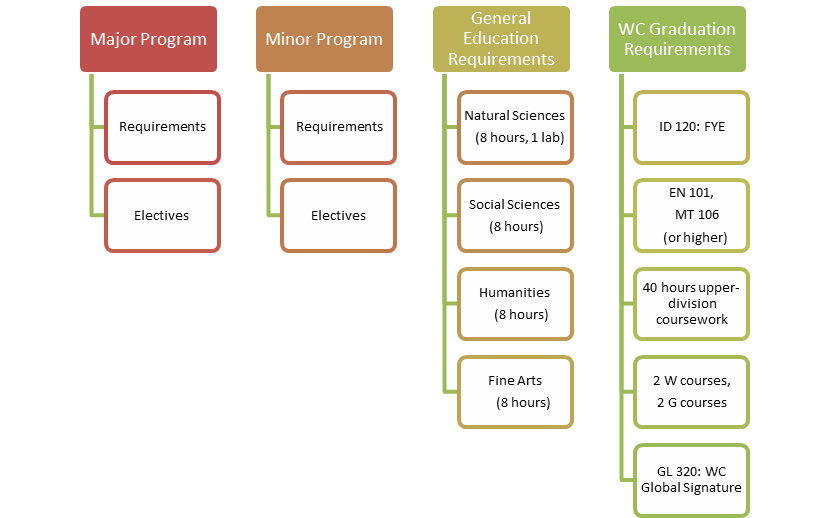
Evaluation:
Final grades will be calculated based on the following assignment weights:
Assignments: 45%
Passport: 20%
Event & support office visits: 10%
Spring schedule/4-year plan: 15%
Quizzes: 10%
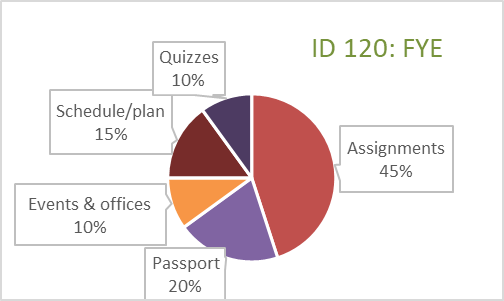
Grading scale:
A | 93.5 < | B+ | 87 < | C+ | 87 < | D | 60 < |
A- | 90 < | B | 83.5 < | C | 83.5 < | F | > 59.9 |
|
| B- | 80 < | C- | 70 < |
|
|
Instructor Course Policies
Attendance/Engagement is required at all class meetings, special events and activities. You get 2 absence freebies, whatever the reason! (illness, death, relationship drama, POS car, alien abduction…). Because this is an abbreviated course, any absences in excess of 2 will result in automatic failure of the course. Be sure to plan work shifts, medical appointments, family events, and other commitments carefully. If you must be gone, e-mail me as soon as you know you will be absent and understand that you are still responsible for coursework due or covered that day. See current Student Handbook for the college attendance policy especially as it pertains to excused absences.
Effective Communication with professors is vital for academic success. Check your college e-mail at least once a day for messages from me, other professors, and college officials. Check your Pyle mail box regularly. Arrange for a class buddy to pick up handouts if you have to be absent. If possible, communicate with me by e-mail rather than the office phone and voicemail.
Classroom etiquette: Please arrive on time and refrain from packing up early, dozing off, walking out for non-emergency bathroom/drinking fountain visits, holding side-bar conversations, listening to electronic equipment, text-messaging, and checking phones. Students may be asked to leave class for these or other breaches of etiquette. FYI—I know you are checking texts on your watch too!
As this course discusses college life both in and outside of the classroom, we may sometimes discuss difficult, controversial and personal topics. This can include disagreement, conflict, and learning alongside one another. Your thoughts, analysis, opinions, and experiences are welcome in this space. What will not be tolerated is the dehumanization of any person—whether they are in this classroom or not. Please be respectful.
Academic Integrity: Academic dishonesty in any form will not be tolerated. See the current Student Handbook for the College’s Academic Integrity Policies as they pertain to examinations, plagiarism, classroom behavior, and the process for handling academic misconduct charges. Penalties for plagiarism or cheating in this class may range from an F on the assignment to an F in the class. In addition, all cases will be reported in writing to the Office of Academic Affairs. In the case of serious infractions, the Academic Standards and Appeals Committee may take further action.
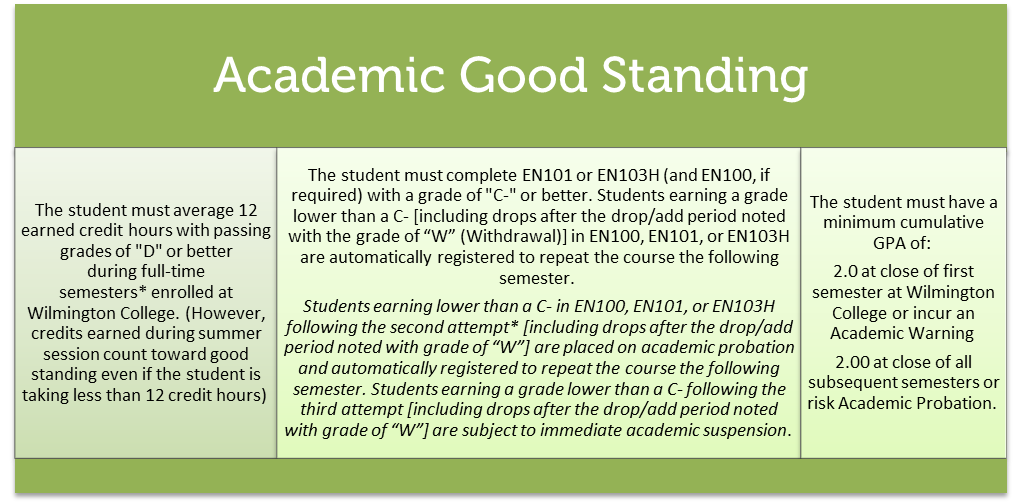
Academic Offenses: No student shall engage in any form of improper or unethical conduct listed below. Furthermore, no student shall engage in any form of improper or unethical conduct designated as such by the faculty member teaching the course even though it is not specifically included in the listing below.
Examination offenses include, but are not limited to, the following:
- Taking unauthorized materials into or out of the examination room.
- Leaving the examination room without authorization before completing an examination.
- Talking in the examination room without authorization.
- Discussing the examination outside the examination room during the course of the examination.
- Attempting to observe the work of another student.
- Taking an examination for another person, or permitting someone else to do so.
- Collaborating improperly by discussion, joint research, or joint effort in any way expressly prohibited by the instructor.
- Using a cell phone, iPad or other electronic device.
Written work offenses include, but are not limited to, the following, which are expressly prohibited in the absence of prior written approval of the instructor or instructors involved:
- Resubmission of work – Submitting work which has been previously submitted for credit.
- Plagiarism – Submitting work done wholly or partly by another, including the unattributed copying of all or parts of a published work. Information available on the Internet is considered “published work” and must be cited appropriately.
- Prohibited sources – Consulting material or persons contrary to the directions of the instructor.
- Improper collaboration – Engaging in any discussion, joint research, or joint effort of a kind expressly prohibited by the instructor.
- Deception – Misrepresenting the authenticity of sources, citations, or principles in any written work.
- Other misconduct – Engaging in any other improper conduct as specified by the instructor.
Institutional and Program-Level Policies
All exams will follow the Final Exam Schedule. Students scheduled to take three or more final examinations on one day may request to arrange their examination schedule, so no more than two exams occur on one day.
Requests for early or late exams are considered only under extreme circumstances. Prior to the exam period, the student must file a written request on the Early/Late Exam Form available in the Student One Stop Center, Academic Records, and on the WC portal. The form must be signed by the Instructor and the Academic Dean, approving the alternate exam time. This process must be completed prior to the scheduled exam period.
Undergraduate: SP25 Final Exam Schedule Graduate:
Out-of-class Work Expectation A minimum of 2 hours of out-of-class student work is expected for each hour of in-class time for traditional face-to-face courses. For online and hybrid courses, the combination of face-to-face time and out-of-class work should be equal to 3 hours per credit hour per week. |
Instructional Course Delivery |
Academic Integrity Policy The use of generative AI is prohibited except where expressly allowed in assignment instructions. |
Class Attendance Policy |
Accessibility and Disability Services
Accessibility and Disability Services
Wilmington College provides accommodations and services for student with a variety of disabilities, including chronic illnesses, psychological, physical, medical, learning, and sensory disability amongst others. If you anticipate or experience barriers based on disability and feel you may need a reasonable accommodation to fulfill the essential functions of this course, you are encouraged to contact:
Spencer Izor, Associate Vice President of Compliance - Title IX/ADA Coordinator at spencer.izor@wilmington.edu or 937-481-2365 or Nathan Flack, Academic Resource Manager at 937-481-2208 to learn more about the process and procedures for requesting accommodations, or by visiting College Hall Room 306a or the Robinson Communication Center, Room 103.
Religious Accommodations
Wilmington College strives for an inclusive climate and welcomes students from all backgrounds, faiths, and experiences. If religious observance impedes your ability to participate fully in classroom activities or a principal holiday from your religious tradition occurs during the semester and conflicts with class meetings or activities, please make the professor aware of this immediately to determine if a reasonable accommodation is possible.
